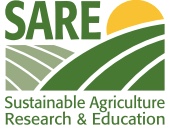About Us
“Harnessing Microbes for Sustainable Food Production” is a USDA Sustainable Agriculture Research & Education (SARE) program funded research and education project. Our practices include education and training about basic knowledge on beneficial microbes in soils, and methods to improve soil health through enrichment of soil microbes.
In order to make food production sustainable, farming practices and operations must be sustainable. Soil nutrients, leachate water quality, and farm waste need to be managed efficiently to mitigate negative environmental impacts of farming. Microorganisms are essential and play important roles in agriculture by facilitating growth of plants via symbiotic interactions, maintaining the water quality of receiving water bodies, and converting farm waste into renewable energy and nutrient-rich biofertilizer. The microbial processes are natural rather than synthetic, mediating long-lasting interactions between nutrients, plants, and soils.
This project consists of an education program on the crucial roles of microbes in sustainable agriculture. Topics covered include microbes involved in the nitrogen cycle, the phosphorus cycle, mycorrhizal fungi, and microbes that are involved in anaerobic digestion and composting of farm waste. This education program will allow farmers to learn methods to sustainably fertilize and improve soils using naturally occurring materials and processes, the concept that over fertilization or irrigation may pollute groundwater or reservoirs, and skills about waste conversion into renewable energy and biofertilizer, which make farming operations more sustainable.


